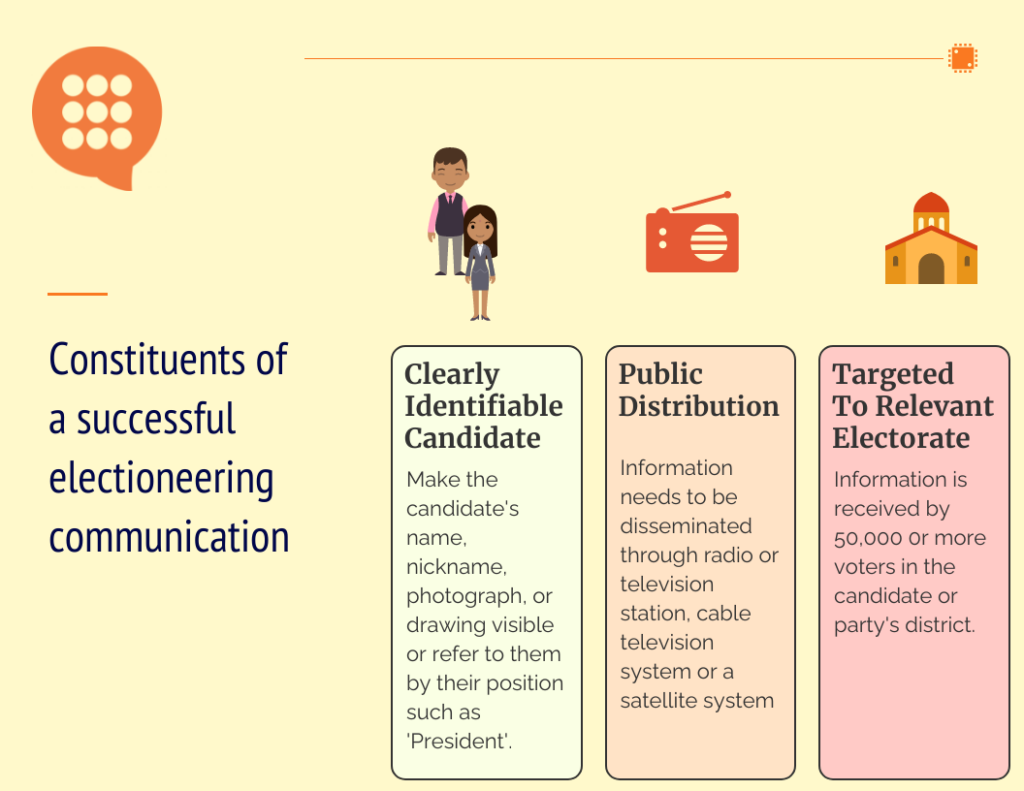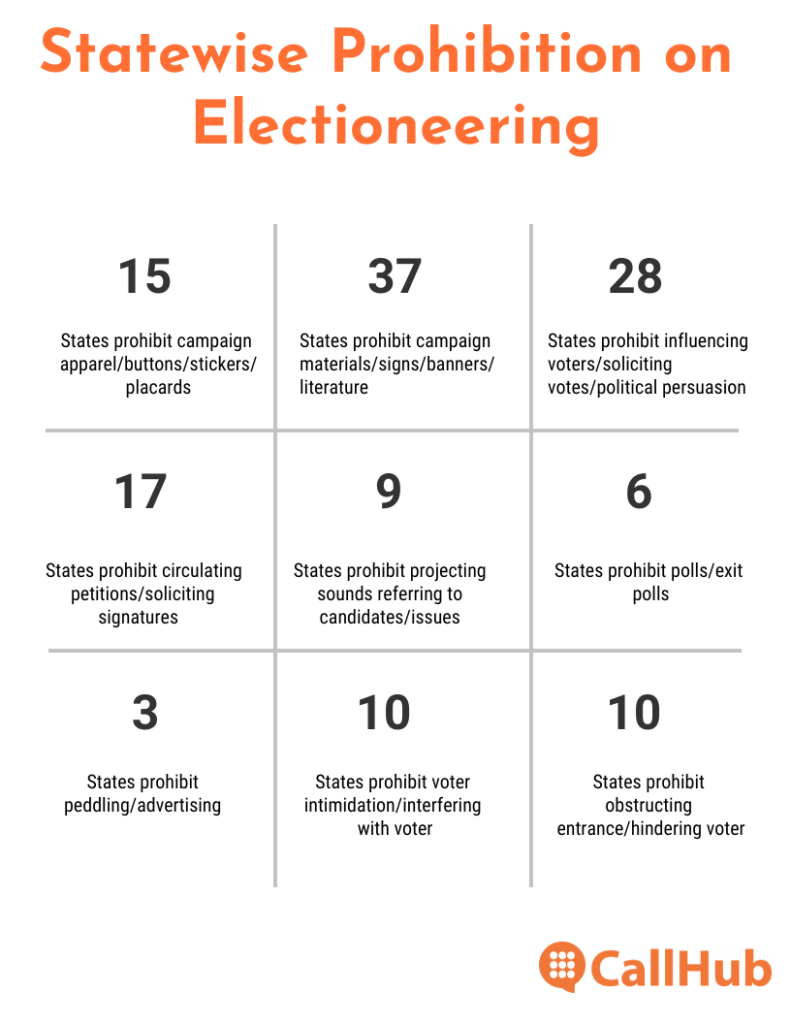Table of Contents
Electioneering efforts refer to the specific ways in which different political groups convince voters to cast votes for or against a particular party, candidate, or issue. It could be through advertisements on cable TV, radio, or satellite broadcasts.
Electioneering efforts have generally been mired in controversy due to the limitations placed on them. Therefore, whenever you decide to plan a campaign, you need to be prepared with a checklist of laws and compliance requirements to ensure it runs smoothly.
This article explores electioneering communications and laws to help your lobbying efforts.
What are electioneering communications?

An electioneering communication is any communication that refers to a particular federal candidate, party, or issue. It is disseminated to the candidate or party’s electorate through broadcast, satellite, or cable mediums.
Electioneering communications are defined as:
- Broadcast ads (on television or radio)
- Airing within 30 days of a primary election or 60 days of a general election
- Referring to a clearly identifiable federal candidate
- Aiming at 50,000 or more members of the electorate of the office the candidate is seeking.
Electioneering communications include:
- Soliciting votes or speaking with voters to influence their voting decisions.
- Placing or posting any political campaign literature, such as posters, stickers, and brochures relating to a particular candidate.
- Distributing and wearing campaign paraphernalia, such as t-shirts, hoodies, etc., relating to a specific candidate, party, or issue.
- Using audio equipment to raise awareness about a political candidate, party, or issue.
- Placing a banner or sign on a vehicle to solicit a vote for or recommend against a particular candidate or party.
Electioneering efforts can be undertaken by:
- Any individual or group of people who want to support or oppose a federal candidate or party.
- Corporations that want to support or oppose policies and measures proposed during an election campaign.
- Labor organizations that would like to encourage or discourage a candidate or party from serving their interests.
The definition of electioneering communication is very rigid, and several factors determine whether a particular political communication amounts to electioneering efforts or not. Keeping in mind those guidelines, you need to know what will not constitute electioneering communication.
This helps you significantly in staying compliant with laws and regulations.
When is your political communication NOT electioneering:
The first step to successful electioneering efforts is realizing which activities will count as electioneering. Once you are clear on what it does and does not constitute, it will be easier to strategize your political lobbying and campaigns accordingly. Here is when your communication is NOT electioneering:
- Your communication will not be considered an electioneering effort when it is publicly distributed on a platform other than broadcast, cable, or satellite media.
- It is mentioned in a story, editorial, or news article, distributed through channels – broadcast, cable, or satellite media—not owned or controlled by a political party or candidate.
- It is a communication that incurs an expenditure while trying to influence an election.
- It is an election-related news story and covers other opposition parties and candidates equally and fairly.
- An event will not be considered an electioneering effort if it is a debate or a forum discussion, or a promotion of such an event.
- It is paid for by a nonfederal candidate contesting in a nonfederal election as long as it does not attack or support a federal candidate.
What constitutes electioneering communications and its limitations during election periods are continuously being challenged. While the court has set specific rules for what is allowed, activists contend that laws hinder first amendment rights.
No matter how complicated, when engaging in electioneering efforts, you need to know the laws to stay compliant. We’ve listed them below for you.
Electioneering laws
Knowing electioneering laws is useful because-
- You can ensure a successful run for the campaign by staying compliant with local regulations.
- You know when you are well within your rights to electioneer so that your campaign cannot be stopped by anyone.
- You can innovate within legal frameworks to campaign for or against candidates. For example, if the law mandates that you cannot electioneer within 100 ft of the polling station, you could set up your electioneering efforts a little beyond 100ft.
Read Also: Healthy Ways for Negative Campaigning (and How to Fight It!)
Electioneering laws you must know about:

- Any electioneering effort costing upwards of $10,000 must be reported to the Federal Election Commission (FEC).
- Creating a nuisance to poll workers and volunteers through excessive noise is prohibited.
- If an electioneering communication is paid for by an individual, union, corporate, or any other organization, but not authorized by the candidate or the party, then you need to issue disclaimer notices. In the notice, you need to mention who paid for the communication and whether the candidate authorized it or not.
- On election day, you cannot electioneer within 100 feet of the pooling booth. 100 feet is measured from the door of the polling booth where voters enter to register and cast their ballots. Anyone electioneering within these limits will be asked to cease the activity and leave the premises immediately.
- Media campaign disclosure laws apply to TV and radio advertisements that run ads for a ‘clearly identifiable candidate.’ They need to disclose the name and address of the individual or group that sponsored the electioneering advertisement to the public. This makes the sponsor accountable.
- The Federal Election Campaign Act prevents foreign interference by prohibiting foreign nationals from:
- Making any donation or expenditure for a campaign.
- Making a contribution or donation to any local, state, or federal political party.
- Sponsoring an electioneering effort or communication.
- Donating to the presidential inaugural committee.
Any foreign national, except green cardholders, are subject to penalties and criminal prosecution if they do not follow these regulations.
- You can report any violations you observe directly to your state election office. You could also file a complaint with the Civil Rights Division of the Department of Justice.
The way forward
Electioneering efforts are essential in aiding the win of a party or candidate that you support. In addition to being aware and compliant with the laws, one also needs to know other ways to support their candidate.
While awareness certainly goes a long way in winning elections, fundraising is the second crucial part of a successful election. Raising funds is vital to support or oppose candidates and parties and work towards your political goals. CallHub has several resources to guide you through fundraising. Read our article Writing the Perfect Nonprofit Fundraising Plan – In 10 Easy Steps. to learn more.
Featured Image Source: Skylar Kang

